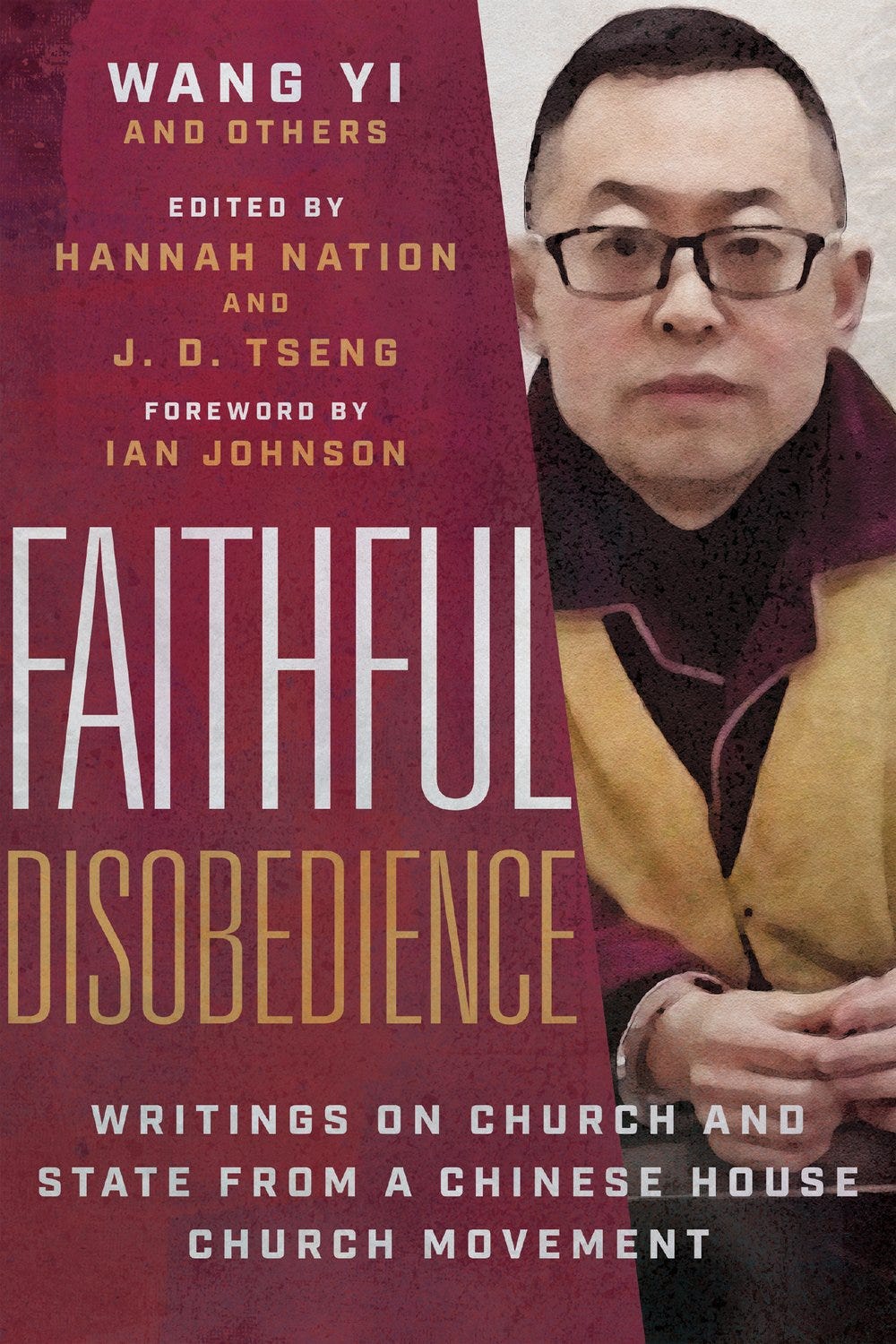“As a pastor, my disobedience is one part of the gospel commission. Christ’s Great Commission requires of us great disobedience. The goal of disobedience is not to change the world but to testify about another world.”
- Wang Yi
Okay, my # 1 best read of the year so far - I know it’s only February - is the collected writings of Wang Yi in Faithful Disobedience: Writings on Church and State from a Chinese House Church Movement, edited by Hannah Nation and J.D. Tseng, published by InterVarsity Press, 2022.
If you don’t know, Wang Yi is a human rights lawyer and Reformed pastor in the “unregistered” churches in China, who was arrested in 2018, and remains in prison.
This is a great volume that touches on various things, including:
History of the Protestant churches in China since the communist takeover in 1949.
The conflict between the Three-Self Patriotic Movement (TSPM) as the official state church and the house churches/unregistered churches.
The increase in persecution of Chinese churches since 2018.
Wang Yi’s philosophy of church-state relations and faithful disobedience to an autocratic government.
Wang Yi’s theology is - says Hannah Nation - an example of “post-postcolonial” political theology.
Yi is very critical of the TSPM as part of the “religious industrial complex” by “submitting to the cause of political power” (26) and the TSPM is “an antichrist movement precisely because it does not recognize a public faith and the existence of a kingdom that is above nation-states, and it attempts to set up a ‘nationalist church’ via the regime” (28-29). The TSPM “sold its brightright for a bowl of red stew” (47 - Jin Mingri).
Yi takes Rom 13:1-7 very seriously, including the idea of government as divinely instituted, even to “bear the sword.” But he is adamant that the Chinese Communist Party (CCP) is violating its own constitution about religious freedom. Therefore, non-violent disobedience is warranted because (i) Christ not the CCP is the head of the church; and (ii) the separation of church and state means that Christians cannot join the “caesaro-papist” system” of the TSPM. If you think Yi is too harsh against those who seek to worship in the safety of a government-regulated church, then you have to remember that some TSPM theologians once claimed that Mao’s “cultural revolution” was a movement of the Holy Spirit. The TPSM also has prohibited Bible readings and even quotas on the number of people it can baptize.
The highlight of the book is the 95 Theses about the house churches vis-a-vis the CCP.
There is an important section against the “Sinicization of Christianity.” I found this intriguing because it forces us to ask what is the difference between “contextualization” and “compromise and capitulation” to the autocracy of the CCP. According to Yi, “The church needs to oppose the ‘Sinicization of Christianity.’ That means opposing the use of culture to alter the gospel, the use of politics to bind the faith, the use of Chinese tradition that is antagonistic toward God to destroy the faithful traditions of the Catholic church.”
There is also an excellent counter-imperial reading of Col 1:15-20. Yi recounts a conversation with a police interrogator:
“I am telling you about a power that will last forever. But this power does not demand lands, swords, or all the authority in this day. On the contrary, it is willing to humble itself and submit to the swords and authorities on earth. If you wany to use earthly power today to oppress the eternal power, this Scripture has already revealed the end result. History is Christ written large, not Xi Jinping written large” (184).
There is also a pastoral letter from Yi where he talks about how God uses persecution to shepherd the church. He writes:
“The great benefit of the church-state conflict is our union with a Christ who himself was judged. Caesar’s focus was not whether you believed in Jesus (as they often said, ‘We do not care if you believe in Jesus’), but whether you believe Jesus is ‘the king.’ Persecution forces us to answer the world the same way we answer the Lord: ‘Yes. He is the king.’ In this way, we allow the police to tear their clothes and say, ‘What else can we say? They are inciting subversion of state power.’” (177).
My favourite quote from Yi is this:
“Test yourself to see if you are crazy for the gospel. When you are threatened with death for the gospel, you find out for whom you really live. When faced with the risk of job loss, you know for whom you really work. When you may lose fortune and position for the sake of the gospel, you find out whether you are crazy for money or crazy for the gospel” (178).
May we all be crazy for the gospel!
My advice, buy and read this book, you won’t be disappointed.
Also, pray for Pastor Wang Yi and the house churches of China!





I have been reading a bit about the Chinese Christian situation, and while I am very sympathetic to Wang Yi and agree with many of his points, I also wonder if there is a way to hear from people inside the state-sponsored system about the authenticity of their practice despite their Babylonian captivity, so to speak.
Thanks Dr. Bird for this great post. I will definitely buy this book and read it.
By the way, and completely unrelated to the post’s topic, what do you think about Bauckham’s interpretation of 2 Peter 1:4?